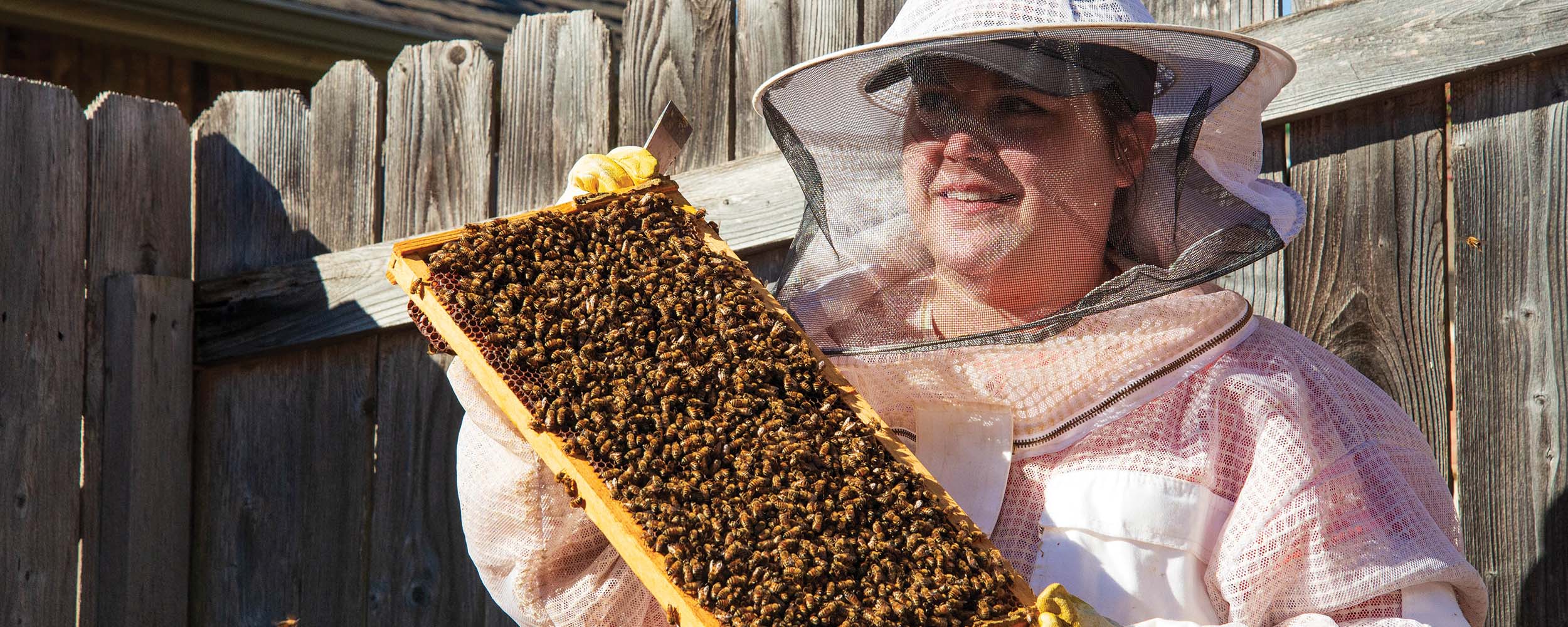
Bees and Bytes
Tuesday, January 2, 2024
Media Contact: Sophia Fahleson | Digital Communications Specialist | 405-744-7063 | sophia.fahleson@okstate.edu
Oklahomans are buzzing about beekeeping and seeking knowledge through Oklahoma State University Extension resources.
Oklahomans’ interest in beekeeping picked up speed in January 2019, said Courtney Bir, OSU agricultural economics assistant professor and OSU Extension state specialist.
As Bir gathered information to provide resources for Oklahomans on beekeeping, she found a lack of consistency and financial budgeting tools.
Bir felt the need to get a better handle on how beekeeping works to speak knowledgeably about the subject and teach about the economics.
The duty of an OSU Extension educator is to serve the public, Bir said.
“Being an OSU Extension state specialist and an economist, it was important to understand the components of beekeeping to have a more encompassing educational platform for Oklahomans,” she said.
As Bir pondered how to better educate the public on beekeeping, she committed to the unlikely — she became a beekeeper.
After personally investing in and learning from her own beehives, Bir created the OSU Beekeeping Program. The project was made possible through the investment of a Southern Risk Management grant of $11,957.
“The entomology department does not have a pollinator specialist,” Bir said, “and because bees are livestock, we took a farm management approach to the OSU Beekeeping Program.”
Bir’s approach was to treat bees like any other livestock species where a budget and best practices are necessary in terms of farm management and economic analysis.
The mission of this program was to assist in minimizing production, financial and legal risks for beekeepers.
This was accomplished through providing information to individuals on the correct way to label honey and having budgets available to increase financial awareness, Bir said.
“It was a spur-of-the-moment, pandemic decision to bring my work home, become a beekeeper in spring 2020, and order a 3-pound package of honeybees from Texas,” she said.
The true force behind being a beekeeper is Bir’s passion for education, she said. Additionally, Bir worked to better understand the economic importance of beekeeping as a livestock enterprise, she said.
“The principal intention was to appeal to beginning and small-scale farmers and ranchers because many individuals who live on smaller acreages are always looking for different enterprises but don’t realize honeybees qualify as livestock for U.S. Department of Agriculture programs,” Bir said.
The economics behind the educational aspect of the OSU Beekeeping Program is built upon firsthand experience and further research, she said.
“Compared to other agricultural enterprises, beekeeping isn’t the cheapest,” Bir said. “Startup costs range from $600 to $1,000.
“It’s important to understand the costs fluctuate depending on how an operation works — if it is the Cadillac version or if everything is built from scratch,” she added.
Not everyone should have bees because available pollen or nectar is the primary limiting factor, Bir said. This is comparatively true for other livestock enterprises, as well, she said.
“This resource availability should be considered when deciding to enter into beekeeping for both honey production and pollination purposes,” Bir said.
Individuals working with bees should be mindful of pesticide usage in garden environments to not accidentally impair honeybees and native pollinators, she said.
“With growing interest in beekeeping, lack of consistent economic information was a driving force for the program and the reason behind hosting public workshops,” Bir said.
The beekeeping workshops give nontraditional agriculturalists the opportunity to learn more about raising honeybees, said JJ Jones, southeast area agricultural economics specialist and agricultural program leader for OSU Extension.
“The beekeeping workshops are offered in Tulsa, in Oklahoma City, and at the county level,” Jones said. “Individuals learn the basics of Beekeeping 101, such as equipment, suits, three-year plans, regulations, bee biology, breed overview, and diseases, like deformed wing virus.”
All age groups interested in beekeeping are encouraged to attend the OSU Beekeeping Program workshops, he said.
“The OSU Beekeeping Program has opened the OSU Extension education door for those more familiar with plows, cows and sows,” Jones said.
This program educates prospective beekeepers from trial and error built on Bir’s personal experiences, research, and a beekeeping budget.
“Many individuals think beekeeping is a simple a task,” Jones said. “However, beekeeping is not an ordinary livestock enterprise.
“Courtney Bir has showcased her experiences in every educational aspect of the program,” he said.
Bailey Norwood, agricultural economics professor, helped gather educational footage and observed the correct way to harvest honey at the Robert M. Kerr Food and Agricultural Products Center.
“I have an admiration for the OSU Beekeeping Program,” Norwood said, “Courtney Bir went the extra mile to raise bees, become well versed in the subject, better educate the public, and incorporate livestock economics.”
Having prior experience with Bir on a professional level and from a friendship standpoint, Norwood said Bir never does anything halfway and this transfers to her beekeeping efforts, as well.
“It’s amazing to see how far the OSU Beekeeping Program has come,” Norwood said. “Courtney Bir has put her passion for OSU Extension education at the forefront of becoming a beekeeper.”
Introducing an online course
Expanding your knowledge about beekeeping is more accessible now because of a new Introduction to Beekeeping online course. The course is designed for any age range and knowledge level when it comes to the diverse basics of beekeeping. If you are interested in the beekeeping course, learn more online.
Story by: Emma Grace Nowotny | Cowboy Journal
